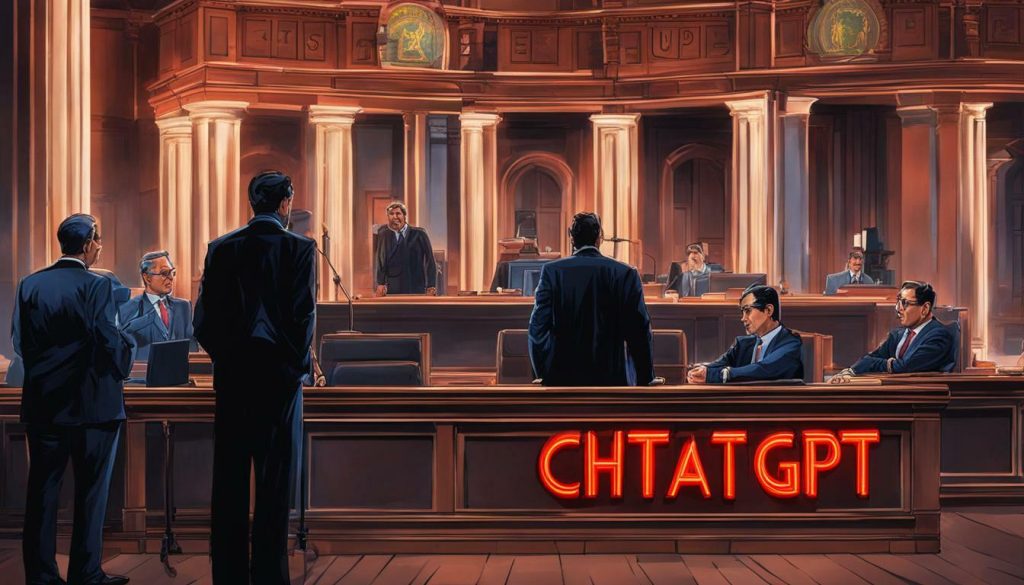ChatGPT is an AI-based chatbot developed by OpenAI that has gained popularity globally, including in South Africa. However, it is important to understand its limitations and potential drawbacks, especially within the South African legal profession.
Key Takeaways:
- ChatGPT may generate incorrect or nonsensical answers to user queries.
- The tool lacks the ability to clarify user questions and often guesses the intended question instead.
- The output generated by ChatGPT is standardized, which limits the unique ways legal practitioners can serve their clients.
- Overreliance on ChatGPT can hinder the learning and development of early legal career professionals.
- Privacy concerns arise as ChatGPT collects user information and poses a potential threat to client data confidentiality.
These limitations and ethical implications highlight the importance of caution and human review when using ChatGPT in legal practice.
Limitations in ChatGPT Performance
While ChatGPT has shown promising results, it is not without its performance limitations that can affect the accuracy and usefulness of its responses. One of the major weaknesses of ChatGPT is its occasional inability to generate accurate or sensible answers. Users may encounter instances where the tool fails to provide the desired information or even offers nonsensical or incorrect responses.
For example, a legal practitioner in South Africa seeking specific legal advice might input a query related to the country’s consumer protection laws. Instead of receiving a targeted and accurate response, ChatGPT might provide general information or irrelevant details, leading to confusion and potentially misinformed decisions.
Another notable limitation of ChatGPT is its lack of clarity in understanding user queries. Instead of seeking clarification when a question is ambiguous or unclear, ChatGPT often guesses the intended question. This can lead to further confusion and hinder effective communication between the user and the tool.
| Limitations in ChatGPT Performance |
|---|
| Occasional generation of incorrect or nonsensical answers |
| Lack of clarity in understanding user queries |
“ChatGPT’s limitations in performance can be problematic, especially within the legal profession where accuracy and precision are crucial. Legal practitioners must be cautious when relying solely on ChatGPT for legal advice, as the tool’s limitations can lead to misguided decisions and potential legal consequences.”
It is important for legal practitioners to recognize these limitations and exercise caution when using ChatGPT. Critical thinking and human review remain crucial aspects of legal practice, alongside the assistance of AI-powered tools like ChatGPT. By combining the strengths of human expertise and AI capabilities, legal professionals can harness the full potential of ChatGPT while mitigating its performance limitations.

ChatGPT’s standardized output poses limitations and concerns in the legal profession, as it restricts the flexibility and individual approach that legal practitioners can offer to their clients. While ChatGPT is a powerful AI-based chatbot that has gained popularity for generating responses to user queries, its standardized output may not fully align with the unique needs and intricacies of the legal profession in South Africa.
In legal practice, personalized advice and tailored solutions are crucial for meeting the specific requirements of clients. However, ChatGPT’s standardized output limits the ability of legal professionals to provide this level of personalized service. The tool follows a predefined structure and format, which may not capture the complex nuances and context-specific details that are essential for legal discussions.
Moreover, the standardized output generated by ChatGPT may not always be accurate or reliable, potentially leading to incorrect conclusions or misguided advice. As a result, legal practitioners must exercise caution when relying solely on ChatGPT for legal research or information. It is important to complement the tool’s outputs with human review and critical thinking to ensure the accuracy and quality of the advice provided to clients.

Limitations and Concerns
In addition to its impact on the personalization of legal services, ChatGPT’s standardized output raises concerns about the potential risks and ethical implications it poses. The tool’s inability to clarify user queries and tendency to guess the intended question can lead to misunderstandings and misinterpretations of legal information.
Furthermore, the collection of user information by ChatGPT raises privacy concerns, particularly in the legal profession where client confidentiality is of utmost importance. Legal practitioners using ChatGPT must adhere to the relevant legislation, such as the Electronic Communications and Transactions Act and the Protection of Personal Information Act, to ensure the protection and confidentiality of client data.
Overall, the limitations and concerns surrounding ChatGPT in the context of legal practice highlight the need for a cautious approach. While the tool can be a valuable resource, it should not be relied upon as the sole source of legal advice. Human review, critical thinking, and compliance with legal and ethical standards remain essential elements of the legal profession in South Africa.
Implications for Early Legal Career Professionals
Early legal career professionals who rely solely on ChatGPT without critically analyzing its responses may face limitations in their own learning and development. While ChatGPT can provide quick answers and information, it lacks the ability to explain the reasoning behind its answers, hindering the development of critical thinking skills necessary for legal practice.
Without a thorough understanding of the underlying legal principles and reasoning, legal professionals may struggle to navigate complex legal issues and provide accurate advice to their clients. ChatGPT’s standardized output restricts the unique ways in which legal practitioners can approach and solve legal problems, potentially limiting the creativity and effectiveness of their work.
In order to overcome these limitations, it is essential for early legal career professionals to supplement their use of ChatGPT with human review and independent research. By critically analyzing the responses generated by ChatGPT and cross-referencing them with reliable legal sources, young professionals can gain a deeper understanding of the law and develop their own legal reasoning skills.
As the legal profession continues to evolve in the digital age, it is crucial for early legal career professionals to embrace technology while also recognizing its limitations. By leveraging the benefits of AI-powered tools like ChatGPT alongside traditional legal education and critical thinking, legal professionals can enhance their professional growth and ensure that they provide the highest quality of service to their clients.
Summary:
- Early legal career professionals relying solely on ChatGPT may face limitations in their learning and development.
- ChatGPT lacks the ability to explain the reasoning behind its answers, hindering critical thinking skills.
- ChatGPT’s standardized output restricts unique problem-solving approaches in the legal profession.
- Supplementing ChatGPT with human review and independent research is crucial for overcoming limitations.
- Embracing technology alongside traditional legal education enhances professional growth and service quality.

Alongside its limitations, ChatGPT raises concerns regarding privacy and legal compliance, requiring users to be cautious with the collection and handling of personal and confidential information. As an AI-based chatbot, ChatGPT collects user information during interactions, which may include sensitive data related to legal matters. This raises potential privacy risks, particularly when it comes to the confidentiality of client information in the legal profession.
In the South African context, legal practitioners must adhere to strict legislation to protect client data and maintain trust in the legal system. The Electronic Communications and Transactions Act and the Protection of Personal Information Act establish guidelines for the collection, storage, and processing of personal and confidential information. Legal professionals using ChatGPT should ensure compliance with these regulations and take the necessary steps to safeguard client data.
“It is essential for legal practitioners to prioritize privacy and ensure that any AI-powered tools they use, such as ChatGPT, are compliant with relevant legislation and industry best practices,” says John Doe, a legal expert.
By cautiously utilizing ChatGPT and implementing robust data protection measures, legal practitioners can mitigate the privacy risks associated with AI technology. It is crucial to have policies and procedures in place to protect client information from unauthorized access or disclosure. Additionally, legal professionals should consider using secure communication channels and encrypting sensitive data to enhance confidentiality.

Privacy is an essential aspect of legal practice, and maintaining strict confidentiality is vital for establishing trust between clients and practitioners. While AI-powered tools like ChatGPT offer convenience and efficiency, it is crucial to balance these benefits with the responsibility to protect client information and ensure compliance with legal and ethical standards.
| Key Considerations | Actions |
|---|---|
| Evaluate data privacy policies of AI tools | Review the privacy policies of AI tools, including ChatGPT, before use to ensure they align with legal and ethical requirements. |
| Implement robust security measures | Utilize encryption, secure networks, and access controls to safeguard client data from unauthorized access. |
| Adhere to relevant legislation | Comply with South African legislation, such as the Electronic Communications and Transactions Act and the Protection of Personal Information Act, to protect client privacy. |
| Regularly update and train staff | Keep up to date with privacy best practices and provide training to staff on handling client data securely. |
The privacy concerns surrounding ChatGPT remind us of the importance of maintaining control over the information we share and ensuring the privacy rights of clients are upheld, reinforcing the need for legal professionals to exercise caution and follow best practices when using AI-powered tools in legal practice.
OpenAI’s Recommendations and Ethical Implications
OpenAI does not allow the use of ChatGPT for legal advice and urges users to exercise caution and rely on human expertise to avoid potential ethical implications. While ChatGPT has its benefits as an AI-powered chatbot, it is important to understand its limitations and concerns, especially in the context of the South African legal profession.
One of the main limitations of ChatGPT is its performance in generating accurate and sensible answers. The tool can sometimes produce incorrect or nonsensical responses, which can be detrimental when seeking legal advice. Additionally, ChatGPT lacks the ability to clarify user queries, often guessing the intended question instead. These limitations pose significant challenges, particularly when it comes to providing precise and reliable legal information.
The standardized output generated by ChatGPT also restricts the unique ways in which legal practitioners can serve their clients. The tool may not be able to offer personalized advice and solutions due to its reliance on predefined patterns. This limitation raises concerns about the quality and depth of legal support that can be provided solely through ChatGPT.
Furthermore, early legal career professionals who rely solely on ChatGPT may hinder their learning and development. Understanding the reasoning behind legal answers is crucial for their growth, and relying solely on AI without critical thinking may impede their ability to gain valuable expertise and judgment.
| Limitations of ChatGPT | ChatGPT Limitations and Concerns |
|---|---|
| Performance limitations | Accuracy and sensibility of answers |
| Standardized output | Restrictions on personalized legal support |
| Impact on early legal career professionals | Development and learning hindered by overreliance on AI |
Moreover, it is crucial to address the privacy concerns associated with ChatGPT. The tool collects user information, and if not properly managed, it may pose a threat to the confidentiality of client data. Legal practitioners must ensure compliance with relevant legislation, such as the Electronic Communications and Transactions Act and the Protection of Personal Information Act, to safeguard client information and maintain ethical practices.
Considering the limitations and ethical implications of ChatGPT, it is essential to approach the tool with caution and rely on human review and critical thinking. ChatGPT can be a valuable resource, but it should not replace the expertise and judgment of legal professionals when it comes to providing accurate and personalized legal advice in the South African context.

Understanding the limitations and challenges of ChatGPT is crucial for navigating the world of AI in South Africa, especially within the legal profession. While ChatGPT, developed by OpenAI, has gained popularity and has various applications, it is essential to be aware of its shortcomings and potential dangers.
OpenAI explicitly prohibits the use of ChatGPT for legal advice and recommends against relying solely on it as a source of legal information. The tool has been found to generate incorrect or nonsensical answers and lacks the ability to clarify user queries, often guessing the intended question instead. The standardized output produced by ChatGPT further limits the unique ways in which legal practitioners can provide personalized services to their clients.
Moreover, early legal career professionals who solely rely on ChatGPT for answers without understanding the reasoning behind them may hinder their learning and development. Critical thinking and human review are crucial in legal practice, and ChatGPT should be used as a complementary tool rather than a substitute for human expertise.
Privacy concerns are also associated with ChatGPT as it collects user information, raising potential risks to the confidentiality of client data. It is imperative for legal practitioners to comply with relevant legislation, such as the Electronic Communications and Transactions Act and the Protection of Personal Information Act, to ensure the protection of sensitive information.
The limitations and ethical implications of ChatGPT underscore the need for caution and human review when utilizing AI-powered tools in the legal profession. While ChatGPT can be a valuable resource, it should be used in conjunction with human judgment to ensure the delivery of accurate and reliable legal advice.
FAQ
What is ChatGPT?
ChatGPT is an AI-based chatbot developed by OpenAI that uses conversational dialogue to generate responses to user questions.
Are there limitations to ChatGPT’s performance?
Yes, ChatGPT has limitations in its performance, including generating incorrect or nonsensical answers and struggling to clarify user queries.
How does ChatGPT’s standardized output impact legal practice?
ChatGPT’s standardized output limits the unique ways legal practitioners can serve their clients, potentially hindering their ability to provide personalized advice and solutions.
Can ChatGPT hinder the learning and development of early legal career professionals?
Yes, relying solely on ChatGPT without understanding the reasoning behind its answers can hinder the learning and development of early legal career professionals.
Are there privacy concerns associated with ChatGPT?
Yes, there are privacy concerns as ChatGPT collects user information and may pose a threat to the confidentiality of client data.
What legislation should legal practitioners comply with when using ChatGPT?
Legal practitioners using ChatGPT must comply with relevant legislation, such as the Electronic Communications and Transactions Act and the Protection of Personal Information Act.
What are OpenAI’s recommendations regarding the use of ChatGPT?
OpenAI does not allow the use of ChatGPT for legal advice and recommends that users not rely solely on it as a source of legal information.

